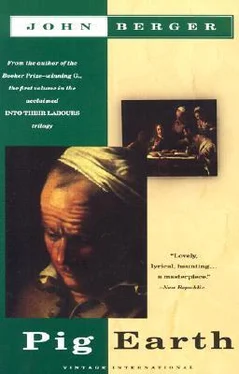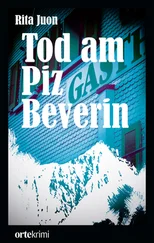Perhaps the attraction of the forains for Edouard was the pride they took in never being taken for fools.
First he sold biscuits and boiled sweets, later mirrors and painted trays. Once he brought home a tray for his mother. It had a stag painted on it. His father was enthusiastic. Look at him, he mused, in the forest! It’s too good to use as a tray!
The tractor was a different matter. His father refused to acknowledge its existence. Two months passed.
One day in June, when the whole family came to help with the haymaking, the four grown-up children agreed amongst themselves to ignore the old man’s opposition.
He’s boneheaded! said Danièle. If we’ve got a tractor, why not use it?
When Marcel’s back was turned, they tethered the mare in the shade of an apple tree, unbolted the shafts, and attached the blue tractor to the hay wagon. Everyone was waiting for the old man to protest and order them to put the horse back. They were going to refuse. To their surprise, Marcel said nothing. As usual he took his place on top of the wagon to build the load. At first he stood, and finally, when the load was three or more metres high, he knelt. Around the cart on the slope the women were raking. The men forked the hay up to him. He directed each fork where to place the hay, he folded the swaths in upon themselves, he constructed the corners and he keyed the corners into the centre. He built like a celestial mattress-maker, apparently oblivious or indifferent as to how the wagon would be drawn across the earth.
In the loft the heat and smell of the new hay was already like the breath of an animal. Marcel climbed one of the ladders to fetch a fork which had been left on top. The last hay had not yet lain down. Stalks of it waved slowly in the dim light under the roof timbers. Some of the wall planks had holes in them where their knots had once been. Through these holes came beams of sunlight, narrow as branches. When a stalk crossed a beam, it caught the light for an instant and lit up like a spark.
On top of the hay, he again explained the machines to himself. They make sure we know the machines exist. From then onwards working without one is harder. Not having the machine makes the father look old-fashioned to the son, makes the husband look mean to his wife, makes one neighbour look poor to the next. After he has lived a while with not having the machines, they offer him a loan to buy a tractor. A good cow gives 2,500 litres of milk a year. Ten cows give 25,000 litres a year. The price he receives for all that milk during the whole year is the price of a tractor. This is why he needs a loan. When he has bought the tractor, they say: Now to use the tractor fully you need the machines to go with it, we can lend you the money to buy the machines, and you can pay us back month by month. Without these machines, you are not making proper use of your tractor! And so he buys a machine, and then another, and he falls deeper and deeper into debt. Eventually he is forced to sell out. Which is what they planned in Paris (he pronounced the name of the capital with contempt and recognition — in that order) from the very beginning! Everywhere in the world men go hungry, yet a peasant who works without a tractor is unworthy of his country’s agriculture!
In July the heifer Marquise mounted on Marcel’s back, as if he were a cow and she the bull. Marquise was not yet fully grown. Her teats were no larger than the fingers of a woman’s glove. Marcel fell forward onto his knees. For a week his left leg hurt and, after putting it off several times, he decided to go and see the bone-setter in A.…
It was market day and the bus was crowded. Marcel calculated that it was eight years since he had taken the bus. After half an hour, he could no longer name a single farm or hamlet which they passed.
The bone-setter grasped the old man’s knee in his cool hands. The very white leg had no fat on it at all. The bone-setter rotated the knee and applied some ointment. Marcel paid the fee of three thousand francs and added a pot of honey. The bone-setter protested at the honey.
The honey is from our own bees, said Marcel.
The bus back was not until the afternoon, and so he wandered through the market. The tomatoes on the stalls were more advanced than Nicole’s. Leaving the fruit and vegetables behind, he strolled between hanging carpets which were for sale. The sight of them and their thick pile made him thirsty. In a café he drank two glasses of cold white wine. When he came out, he saw a circle of people, mostly women, looking at somebody he couldn’t see. The ones at the back were standing on tiptoe. From the centre of the circle he heard a man’s voice, like a voice on the radio when the volume is turned up. Idly Marcel looked from woman to woman to decide which one pleased him most. She had wide hips and was wearing a dress with flowers like peonies printed on it, and was holding the hand of a small child. The voice of the invisible speaker continued:
Ladies, do I look like a crook? Did I hear one of you say Yes! Ah well! I know women are suspicious. And if I had to deal with men, like you do, I’d be suspicious!
Suddenly Marcel recognised the voice. The man in the centre of the circle was his own son. Cautiously he approached. He wanted to see without being seen. Edouard was wearing an apron over a bare torso. His shoulders and back were brown from the haymaking. In front of him stood a small folding table with some bottles and tins on it. He picked up a bottle and poured what looked like red ink from it, down the front of his white apron. The stain it made was the shape of a rabbit hanging by its hind legs, except that one front paw was longer than the other. Marcel’s legs were trembling. His son took another bottle and poured a green liquid from it which ran down the overall like a stream and crossed the rabbit. The voice never stopped.
If you have children they spill things over themselves, if you have a husband — no, Madame, I’m not married — he starts looking into the engine of his car without changing his shirt, when you are going out for the evening, he tells you to hurry and you get nervous, you spill nail varnish over your new dress …
With two fingers, Edouard, his son, smeared silver varnish horizontally across the red rabbit on the apron over his stomach. Marcel regretted drinking the white wine because now, in the crowd and heat, he could not stop his legs trembling.
I take a brush, water and ordinary soap …
Edouard scrubbed down his stomach. His face was glistening with sweat, and when he paused between words, he kept his mouth open in a smile.
Soap, as you see, won’t remove these stains …
At the ends of his long brown arms his fingers were coloured red, green, silver. Women in the front row were goggling at his shoulders, not at the monkey-work on his apron.
Now I’m going to rub with this unique cleaning tablet which removes grease, ink, coffee, wine, gravy — which removes everything except dried oil paint, and nothing can remove dried oil paint, it’s like sin …
Marcel’s mother, Edouard’s grandmother, used to say, when she was in the yard at the washing trough: Water washes out everything except sin.
I take my cleaning tablet and gently rub. Up and down …
Jésus! said Marcel loudly.
Edouard spread his arms upwards like a Christ, and the apron, hanging from his neck, was white.
I’m not asking twenty francs. I’m not even asking fifteen. I’d be giving it away at ten. But because of that beautiful young lady wearing the dress with peonies on it, yes, Madame, you’ve melted my heart, I‘M OFFERING IT TO YOU AT ONLY EIGHT FRANCS A TABLET. TWO FOR FIFTEEN. THREE FOR TWENTY!
It was not until several days later that Marcel confronted his son.
I saw you in A … the other day, said the father.
Читать дальше












